John Maier
Workers & Twerkers
Can’t Even: How Millennials Became the Burnout Generation
By Anne Helen Petersen
Chatto & Windus 304pp £14.99
An accepted principle in enlightened circles holds that it is morally wrong, or at least ill-mannered, to judge people according to crude or roughly drawn stereotypes. Luckily, this principle is not often extended to millennials, or the young generally, about whom some rich and largely helpful generalisations come readily to hand.
According to the most popular stereotype, millennials – usually defined as adults born between 1981 and 1996 – are lazy and entitled. They are excessively given to self-absorption and possess a weak or easily defeated work ethic. They also have, we are led to believe, some unattractive qualities. For instance, millennials are morally uncompromising: they have a possessive attitude towards their own virtue and will cling to a moral principle long after the imperatives of good manners, or conversational variety, should have moved things along. They are, in short, unworldly and insufficiently schooled in the unpleasant truths of life. Most absurdly, they remain committed to the fanciful notion that they are all as individuals in some way special or unique, in spite of the overwhelming counter-evidence that they are a dime a dozen. As Anne Helen Petersen points out, according to the popular stereotype, the millennial outlook achieves its apotheosis in the whimsical suggestion ‘that everyone should get a medal, no matter how poorly they did in the race’. Of course, this outlook simply won’t cut it in the real world, and there are – before some millennial asks – no prizes for guessing why.
Petersen rejects this popular view and attempts to give us a more charitable account of the millennials’ condition. Millennials, insofar as they constitute a distinctive class, are distinctly ‘burned out’, exhausted by an economic order that traps and exploits them. ‘Millennials’, Petersen claims, ‘have been denigrated and mischaracterized, blamed for

Sign Up to our newsletter
Receive free articles, highlights from the archive, news, details of prizes, and much more.@Lit_Review
Follow Literary Review on Twitter
Twitter Feed
The era of dollar dominance might be coming to an end. But if not the dollar, which currency will be the backbone of the global economic system?
@HowardJDavies weighs up the alternatives.
Howard Davies - Greenbacks Down, First Editions Up
Howard Davies: Greenbacks Down, First Editions Up - Our Dollar, Your Problem: An Insider’s View of Seven Turbulent...
literaryreview.co.uk
Johannes Gutenberg cut corners at every turn when putting together his bible. How, then, did his creation achieve such renown?
@JosephHone_ investigates.
Joseph Hone - Start the Presses!
Joseph Hone: Start the Presses! - Johannes Gutenberg: A Biography in Books by Eric Marshall White
literaryreview.co.uk
Convinced of her own brilliance, Gertrude Stein wished to be ‘as popular as Gilbert and Sullivan’ and laboured tirelessly to ensure that her celebrity would outlive her.
@sophieolive examines the real Stein.
Sophie Oliver - The Once & Future Genius
Sophie Oliver: The Once & Future Genius - Gertrude Stein: An Afterlife by Francesca Wade
literaryreview.co.uk